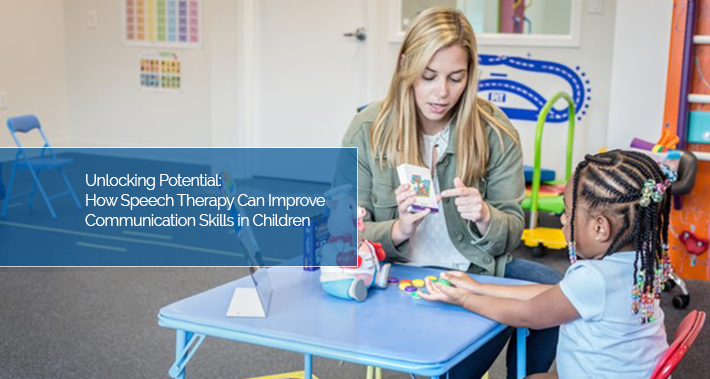Unlocking Potential: How Speech Therapy Can Improve Communication Skills in Children
https://www.triumphtherapeutics.com/wp-content/uploads/2024/06/how-speech-therapy-can-improve-communication-skills-in-children.png 710 379 Triumph Therapeutics Triumph Therapeutics https://www.triumphtherapeutics.com/wp-content/uploads/2024/06/how-speech-therapy-can-improve-communication-skills-in-children.pngUnlocking Potential: How Speech Therapy Can Improve Communication Skills in Children
Understanding Communication Challenges
Communication is a fundamental skill that enables children to express their needs, share their thoughts, and connect with others. However, some children face challenges in developing these skills, which can impact their academic performance, social interactions, and overall well-being. Speech therapy offers targeted interventions to address a range of communication difficulties, from articulation disorders to language delays and social communication issues.
Common Communication Challenges in Children
Children may experience various communication challenges, including:
- Articulation Disorders: Difficulty pronouncing sounds correctly.
- Language Delays: Challenges with understanding and using language appropriately.
- Fluency Disorders: Issues with the flow of speech, such as stuttering.
- Voice Disorders: Problems with pitch, volume, or quality of voice.
- Social Communication Disorders: Difficulty using verbal and nonverbal communication in social contexts.
How Speech Therapy Can Help
Speech therapy is designed to address these challenges by providing individualized support tailored to each child’s needs. At Triumph Therapeutics, we employ evidence-based practices to help children develop their communication skills, fostering their ability to interact effectively and confidently.
Assessment and Individualized Treatment Plans
The first step in speech therapy is a comprehensive assessment to identify the specific nature of a child’s communication challenges. This assessment includes standardized tests, observations, and parent interviews. Based on the results, we create an individualized treatment plan that targets the child’s unique needs and goals.
Enhancing Articulation and Phonological Skills
For children with articulation disorders, speech therapy focuses on improving the production of specific sounds. Through engaging activities and exercises, children learn to produce sounds correctly, enhancing their speech clarity. Phonological therapy, which targets patterns of sound errors, helps children understand and apply the rules of speech sounds, leading to more accurate and intelligible speech.
Developing Language Skills
Language therapy addresses both receptive (understanding) and expressive (speaking) language skills. We use interactive techniques, such as play-based activities and storytelling, to expand vocabulary, improve sentence structure, and enhance comprehension. These activities are designed to be fun and motivating, ensuring that children remain engaged and enthusiastic about their progress.
Improving Fluency and Voice Quality
For children with fluency disorders like stuttering, speech therapy provides strategies to improve speech flow and reduce disfluencies. Techniques such as slow speech, controlled breathing, and gradual exposure to speaking situations help children gain confidence and fluency. Voice therapy addresses issues with pitch, volume, and vocal quality, helping children develop a healthy and effective voice.
Enhancing Social Communication
Social communication skills are essential for effective interactions with peers and adults. Speech therapy helps children understand and use social cues, such as eye contact, body language, and conversational turn-taking. Through role-playing and social stories, children learn to navigate social situations more effectively, improving their ability to form and maintain relationships.
The Importance of Early Intervention
Early intervention is crucial in speech therapy, as it maximizes the potential for improvement and minimizes the impact of communication challenges on a child’s development. The earlier a child receives support, the better their chances of achieving age-appropriate communication skills and thriving in social and academic settings.
The Role of Parents and Caregivers
Parents and caregivers play a vital role in the success of speech therapy. By actively participating in therapy sessions, learning strategies to support their child’s communication development at home, and providing a supportive environment, parents can reinforce the skills learned in therapy and promote ongoing progress.
Conclusion
Speech therapy is a powerful tool for unlocking a child’s communication potential, enabling them to express themselves, connect with others, and achieve success in all areas of life. At Triumph Therapeutics, we are committed to helping children in NW Washington DC and Bethesda, Maryland, overcome communication challenges through personalized, evidence-based interventions. If you have concerns about your child’s communication skills, don’t hesitate to reach out to our team for guidance and support. Together, we can help your child unlock their full potential.
For more information or to schedule a consultation, please contact us at Triumph Therapeutics. Let’s work together to improve your child’s communication skills and foster their growth and confidence.
Remember, you are not alone!
Speech therapy at Triumph Therapeutics can be a transformative experience for children and their families. If you’re looking to help your child unlock their voice and communication potential, contact Triumph Therapeutics today for a free consultation! We can answer any questions you may have and help you determine if speech therapy is the right fit for your child.
Additional Resources:
- American Speech-Language-Hearing Association (ASHA): https://www.asha.org/ provides a wealth of information on childhood speech and language development, including resources for parents and caregivers.
- National Institute on Deafness and Other Communication Disorders (NIDCD): https://www.nih.gov/about-nih/what-we-do/nih-almanac/national-institute-deafness-other-communication-disorders-nidcd offers resources on a variety of communication disorders, including speech sound disorders and language delays.
- The Hanen Centre: https://www.hanen.org/Home.aspx focuses on early intervention for children with language delays and social communication challenges.



